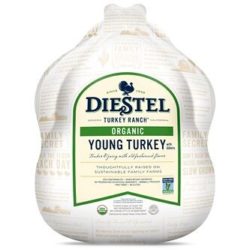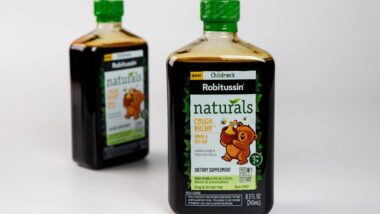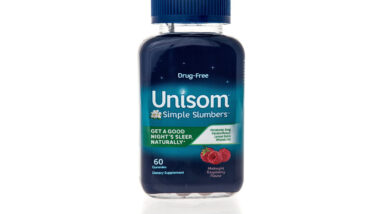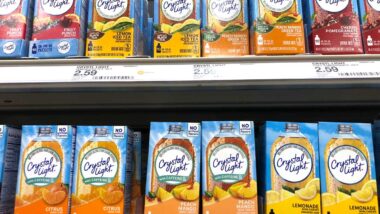
A consumer from New Mexico has filed a federal class action lawsuit over claims Diestel organic turkeys are not raised in the humane way that the company’s marketing and labels say they are.
Diestel Turkey Ranch advertises that its turkeys come from an “idyllic, family-run turkey ranch” in Sonora, California, where the birds roam free, eat a “wholesome diet” and have plenty of fresh air and exercise, the class action lawsuit states. “Diestel workers reportedly ‘walk the flock every day.’”
At least, that’s the image Diestel puts forward.
According to Cynthia Wetzel of Santa Fe, New Mexico, the reality is far different. Wetzel claims the Diestel Turkey Ranch in Sonora is a turkey processing company that gets most of its turkeys from “growers” at factory farms. Those farms raise the turkeys “in large, overcrowded metal sheds that lack sufficient space to engage in natural behaviors and are often mired in manure and slaughterhouse waste,” Wetzel’s class action lawsuit says.
The difference between the marketing and labeling of Diestel organic turkeys and the way they are actually farmed is the basis of the class action lawsuit, which was filed in federal court in New Mexico on Nov. 19.
“Each of defendant’s misrepresentations creates an overall marketing scheme that misleads the public as to the origin of Diestel’s Turkey Products, including the conditions under which the turkeys are raised,” the class action lawsuit says.
Wetzel is arguing that Diestel has violated New Mexico’s unfair business practices act and false advertising law and is guilty of unjust enrichment. She is seeking the court’s approval to represent a national Class of consumers who have purchased Diestel organic turkeys and other turkey products and a Class of consumers who made the same purchases in New Mexico. It is unclear how many potential Class Members might ultimately participate in the class action, but Wetzel’s lawyers say the number will be in the thousands.
The plaintiff has requested a jury trial and is asking for more than $5 million in monetary damages and awards.

She says the turkey was roughly twice as expensive as other turkeys for sale at Whole Foods at the time, but she opted for the Diestel because its labeling and packaging led her to believe the bird was “humanely and happily raised.”
Since then, Wetzel said she learned through reporting done by The Washington Post and The Wall Street Journal, and through public records from the California Regional Water Quality Control Board, that the Sonora Ranch Diestel’s turkeys purportedly come from is really just a slaughterhouse and processing center.
According to the class action, the newspapers published the results of their nine-month investigation of the Diestel Turkey Ranch on Nov. 23, 2015 that included video of the Sonora Ranch operation and a secondary turkey farm in nearby Jamestown, California. The Jamestown ranch was described as “an agro-industrial operation with approximately 26 poultry barns, warehousing anywhere from 7,000 to 17,000 Diestel turkeys per barn.”
Diestel representatives told the California Regional Water Quality Control Board in 2013 that the chickens and turkeys raised on the Sonora Ranch are for non-commercial purposes, the class action lawsuit claims.
All of which is “materially different from what defendant leads the public to believe about its purportedly idyllic Sonora Ranch,” Wetzel’s class action complaint says.
The class action lawsuit alleges that less than 1% of Diestel organic turkeys are raised at the Sonora Ranch. The rest come from eight other farms. Diestel also purchases poultry parts from other suppliers and packages them as coming from the “humane” Sonora Ranch, the class action lawsuit says.
Have you ever purchased Diestel organic turkeys? Is it important to you to purchase organic food and meat that comes from humanely raised and slaughtered animals? Tell us about it in the comment section below.
Lead plaintiff Wetzel and the proposed Class Members are represented by Gretchen Elsner of Elsner Law and Timothy L. Sifers and Nathaniel K. Scearcy of The Potts Law Firm.
The Diestel Organic Turkeys Class Action Lawsuit is Cynthia Wetzel, et al. v. Diestel Turkey Ranch, et al., Case No. 1:20-cv-01213, in the U.S. District Court for the District of New Mexico.
Read About More Class Action Lawsuits & Class Action Settlements:















145 thoughts onDiestel Organic Turkeys Not Raised Humanely as Labeled, Class Action Lawsuit Says
add me
Have you ever purchased Diestel organic turkeys? YES PLENTY! under the guise that the turkeys are raised humanley. Is it important to you to purchase organic food and meat that comes from humanely raised and slaughtered animals? YES very important
I keep telling myself to buy local because of shit like this. I pay more because I care about what goes in my body not to line their pockets. Add me.
Please add me.
Add me please
Just bought these for thanksgiving. Add me.
add me
yes sign me up
We just had 2 of those for Thanksgiving and Christmas – sign me up.